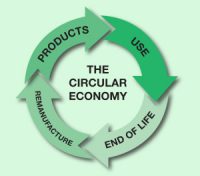The Circular Economy for SMEs (CESME) project has launched in Wales, but is Europe-wide.
Resource reported on the CESME project, focusing on making SMBs’ “route into [the] circular economy” easier, by helping them to “enter the circular economy and develop more sustainable and profitable business operations”. The four-year project, which has begun in Wales, is Europe-wide, and created by the Business Development Centre in Denmark to help SMBs “future-proof their business in a green and more sustainable way”.
CESME will see 10 partners from six European countries “join to share experiences, identify best practice and create a step-by-step guide to help SMEs with the transition”, and the article cited a study from the Waste and Resources Action Programme (WRAP) last year, which found that a Europe-wide circular economy “could create three million extra jobs and reduce unemployment by 520,000” by 2030.
The first phase of CESME aims to “provide policymakers with knowledge of the benefits of the circular economy”, and also highlight “how support packages could be best used to help small businesses adopt more circular business models”. This, it is hoped, will “uncover ways that local and regional authorities can improve policy instruments and design support packages to help SMEs”, with a second phase working with SMBs to “put in place the lessons learned”.
In terms of “breaking down barriers”, Resource noted that the Welsh government represents the UK in the project partnership, with other countries including Denmark, Italy, Finland, Bulgaria and Greece, and Wales hosted the first partner event in Cardiff this May. The project, the news site adds, has a budget of €1.73 million ($1.9 million), and will be co-funded by the Interreg Europe Programme, which is an organisation “created to help regional governments across Europe to develop and deliver better policy”.
Lesley Griffiths, Welsh Environment Secretary, commented: “Wales has a strengthening global reputation for green growth and we recognise the opportunities the circular economy will bring. Sharing valuable expertise will help us break down barriers for SMEs and bring this vision into reality.”
Previously, the European Commission (EC) reported it would be axing plans for an EU circular economy package, before reconsidering and revealing it would increase funding, launching a public consultation, to which both UKCRA and ETIRA contributed their views from remanufacturers. Reports then suggested it would dilute any circular economy package, and doubted their potential.
Despite this, the new package was launched in December 2015 and adopted that month, with a packaging waste recycling target of 75 percent for member states by 2030, and received a funding boost of around €24 billion ($26.3 billion) from the EU soon after. However, Deputy Head of the European Commission’s Waste Unit, Julius Langendorff, stated that “stresses and strains” behind the deal could mean implementing it “will take more than” a year.
